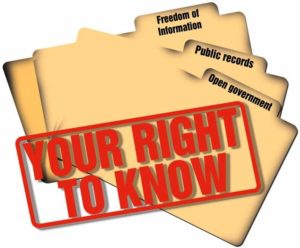 Tired of restrictions and paywalls around public data?
Tired of restrictions and paywalls around public data?
Sick of not being given public records that you have a right to?
We are genealogists, historians, researchers, social scientists, and open government advocates who are filing Freedom of Information requests to get public data released back into the public domain.
We’re collecting information about archivally important data sets that are not available online or on microfilm, and we’re using state and Federal FOI laws and Open Data initiatives to get copies of this information released back to the public.
We’re starting our work in archives in Westchester County in New York State, and will be expanding into different parts of the state, based on demand from people like you.
Along the way, we will be rating county, city, town and village clerks on how well they comply with New York State Freedom Of Information Laws.
Our first FOIL requests, our pilot project, will be an attempt to get access under the New York State Freedom of Information Law (FOIL) from City, Town and vilage clerks in Westchester County and then giving them rating based upon how well the office complied with New York State laws.
We will also be concerned with how friendly and helpful the clerks office was in the process, as well as, how knowledgeable the clerk was about the FOI process.
We’ll be documenting everything we’ve learned about filing Freedom of Information Act requests, and creating a Do-It-Yourself guide for genealogists, open data fans, and others who want their state and local records made more available.
Then we will upload all of the correspondence and records to the non-profit Internet Archive (archive.org) so that the News York State FOI process can be studied.
The clerk ratings will help government officials and voters do a better job of selecting record access officers for their public records.
 Knowing “what your local and state government is up to” is often the first step in ensuring that the government respects the civil liberties of New York citizens.
Knowing “what your local and state government is up to” is often the first step in ensuring that the government respects the civil liberties of New York citizens.
The NY FOI Transparency Project is dedicated to using state freedom of information laws, the courtroom, and our megaphone to shine light on how our public records are being accessed and cared for.
Follow Us On Our Westchester Social Media Pages:
Foil Westchester – Blogger Blog

http://foilwestchester.blogspot.com/
Foil Westchester – Google+ (Google Plus)

https://plus.google.com/u/0/111840483151288487297/posts
Foil Westchester – Facebook Page

Coming Soon – https://www.facebook.com/login/
Access to Public Records in New York
You have a statutory right to inspect New York’s public records using the state’s Freedom of Information Law (“FOIL”).
You have several options open to you should the records access manager deny your request. First, try to work with the records access manager. If the agency is relying on an exemption, ask the records access manager to release the nonexempt portions of the record with the exempt portions removed or redacted.
If you are unable to make headway with the records access manager and your records request remains denied, you have thirty days to appeal to the head of the agency. The agency has ten days to comply with your request, or explain their denial in writing.
If you receive a denial at this point (including if the agency does not respond), you can file a lawsuit with the New York state court to enforce compliance with your request. In some cases the court may award you attorney’s fees.
Who is subject to the Freedom of Information Law?
Every New York State or municipal department, board, bureau, division, commission, committee, public authority, public corporation, council, office or other governmental entity performing a governmental or proprietary function is subject to the Law. Each of those governmental entities is an “agency.” The courts are outside its coverage but often must disclose records under other provisions of law. The State Legislature is covered by the Freedom of Information Law, but is treated differently from agencies generally. Private corporations or companies are not subject to the Freedom of Information Law. See FOIL §86(3) and FOIL Advisory Opinion Index under “A” for “Agency”.
How do I make a request?
Simply write your request and mail it or email to the “records access officer” at the agency where the records are maintained. Here is a sample request made via email.
Can I make a request via email?
Probably. Every agency subject to the Freedom of Information Law, provided that it has the ability to receive requests for records from the public and transmit records by means of email, is required to do so.
How do I make a request via email?Write your request and email it to the agency where the records are requested. Here is a sample request via email. Don’t forget to write “FOIL request” in the subject line.
Must an agency scan records in response to a request?
It is our view that if an agency has the ability to scan records in order to transmit them via email and doing so will not involve any effort additional to an alternative method of responding, it is required to do so. For example, when copy machines are equipped with scanning technology that can create electronic copies of records as easily as paper copies, and the agency would not be required to perform any additional task in order to create an electronic record as opposed to a paper copy, we believe that the agency is required to do so. In that instance, transferring a paper record into electronic format would eliminate any need to collect and account for money owed or paid for preparing paper copies, as well as tasks that would otherwise be carried out. In addition, when a paper record is converted into a digital image, it remains available in electronic format for future use.
In sum, when an agency has the technology to scan a record without an effort additional to responding to a request in a different manner, and a request is made to supply the record via email, in our opinion, the agency must do so to comply with the Freedom of Information Law.
Where should I send my request?
Requests should be mailed or hand-delivered to the “records access officer” of the agency. If the agency has email, an email request may be sent to the email address designated by the agency for such purpose. If you wish to send a request via fax, you should check with the agency first.
Do I contact the Committee on Open Government to get public records?
No, the Committee does not maintain records generally. To obtain records, you must contact the agency that you believe maintains possession of the records. For example, if you are interested in obtaining minutes of a school board meeting, your request should be made to the school district.
What records are available?
All records are available, unless an exception permits an agency to deny access. Most of the exceptions are based upon common sense and the potential for harm that would arise by means of disclosure. If disclosure of records would be damaging to an individual or preclude a government agency from carrying out its duties, it is likely that some aspects of the records may be withheld. See FOIL §87(2).
What records can I obtain electronically?
It depends. Not all records are maintained electronically, and some records which are maintained electronically may not be available in a particular electronic format.
Do I get to choose in which electronic format the records are sent?
If an agency has reasonable means to convert accessible records from one electronic format into a different more desirable format, it must do so at your request.
How long must I wait to get access to records? When an agency receives a request, §89(3)(a) of the Freedom of Information Law states that it has five business days to grant or deny access in whole or in part, or if more time is needed, to acknowledge the receipt of the request in writing and indicate an approximate date by which the agency will respond to the request, usually not more than 20 additional business days. See Explanation of Time Limits for Responding to a Request.
How long must I wait to get access to records if I sent my request via email?
Because an electronic request may be sent at any time, for purposes of determining the date of receipt and the required response time frame, an email request is determined to have been received on the first business day on which it was received during normal business hours. For example, if an email request is sent at 6 pm on Tuesday, it is deemed to have been received at 9 am Wednesday.
When an agency receives a request, §89(3)(a) of the Freedom of Information Law requires that it has five business days to grant or deny access in whole or in part, or if more time is needed, to acknowledge the receipt of the request in writing and indicate an approximate date by which the agency will respond to the request. See Explanation of Time Limits for Responding to a Request.
What happens if an agency fails to respond within five business days of receipt of my request?
A failure to comply with any of the time limitations imposed by law would constitute a denial of a request that may be appealed in accordance with §89(4)(a) of the Freedom of Information Law. That provision states that an appeal must be made within thirty days of the denial. The appeal should be made to the person designated by the agency to determine appeals or the chief executive or governing body of the agency.
What happens if an agency fails to respond to my appeal?
The agency is required to respond to the appeal within ten business days of the receipt of the appeal by granting access to the records or fully explaining the reasons for further denial in writing. See FOIL §89(4)(b). If a determination on the appeal is not rendered within ten business days, the failure to do so constitutes a denial of the appeal. In that circumstance, you may initiate a proceeding to challenge the denial of access under Article 78 of the Civil Practice Law and Rules.
How much can I be charged for public records?
It depends. If you request paper copies, an agency may charge up to twenty-five cents per photocopy up to 9”x14”. If the paper copies requested are larger than 9’x14’, the agency can charge the actual cost of making the copies. See FOIL §87(1)(b)(iii).
If you request records to be transmitted electronically, and the agency maintains the records electronically, there may be no basis for charging a fee. See FOIL §87(1)(b) and (c).
If you request a large volume of electronic records, the agency can charge the actual cost of reproducing the records. When it takes an agency more than 2 hours to prepare, extract or generate electronic data, the agency could charge for the employee’s time. See FOIL §87(1)(b) and (c).
If you request that paper records be scanned and forwarded to you electronically, please see the following advisory opinions:18568, 18620.
Can I inspect records instead of paying the fees?
Yes. Any person has the right to inspect accessible records at no charge. If portions of the records may be withheld, however, the agency is permitted to require payment for redacted copies of records. If portions of electronic records can reasonably be redacted electronically, prior to disclosure, no payment can be required for time needed to review the records and redact.
Do I have to give a reason why I want public records?
No. A person requesting records cannot be required to provide a reason or indicate the intended use of the record might be. The only instance in which the purpose of a request is relevant is when the request is for a list of names and residence addresses. Only in that instance is the agency authorized to seek certification that the list will not be used for solicitation or fund-raising purposes; if it is determined that a list will be used for those purposes, an agency can deny access. See FOIL§89(3)(a), §87(2)(b) and §89(2)(b).
I asked a local government official a question about his office, but he didn’t answer. What can I do to make him answer?
The Freedom of Information Law pertains to records; it is not intended to be used as a vehicle for cross examining government officials or employees. Therefore, an agency is not required to answer questions or to create a new record in response to questions. While agency staff may answer questions, and many do, that service is separate from the requirements of the Freedom of Information Law, which deals with requests for existing records.
Do I have a right to know how government spends money?
Yes. Records reflective of government expenditures are generally available. Also, every agency is required to create a payroll record which indicates the name, public office address, title and salary of every officer or employee of the agency. See FOIL §87(3)(b).
Can an agency deny my request because it is too broad or too vague?
An agency may reject a request that does not “reasonably describe” records. If the request is too vague to answer, the agency must seek clarification of the request, and when appropriate, indicate the manner in which records are filed, retrieved or generated. Also, the nature of an agency’s filing or record retrieval system is relevant to whether a request reasonably describes records. If locating a record involves the equivalent of searching for the needle in the haystack, the request likely does not reasonably describe the record. In that instance, the agency should be contacted to learn how its records are kept or filed.
How can I learn more specific information about access to records?
Through the FOIL advisory opinion index. Committee staff prepares written advisory opinions in response to particular sets of facts and circumstances. Many are available online, through two separate indexes (FOIL and Open Meetings Law), organized by key phrase.
For example, if you would like to know whether assessment rolls are public, you could review opinions under “A” for “Assessment Information” through the Freedom of Information Law index. If you are unable to find an opinion through the key phrase index, use the Google search box above the alphabet grid to locate opinions with particular words or phrases.
These opinions represent the view of the Committee on Open Government at the time that they were rendered. They may not longer represent those views if, for example, there have been subsequent court decisions or statutory amendments that bear on the issues discussed in the opinions.
Advisory opinions that are not available online, primarily those prepared prior to 1993, are maintained by the Committee on Open Government and a various law libraries throughout the state. Copies of opinions are available by contacting the Committee.
VIDEO:
This Committee on Open Government education video, which gives an explanation of FOIL, as well as the Open Meetings Law, is available on the Department of State’s website at www.dos.ny.gov , YouTube, as well as DVD upon request to the Committee by calling (518) 474-2518.
Chapter 1 – Introduction (1:28)
Chapter 2 – Open Meetings Law (:44)
Chapter 3 – Advisory Bodies (1:47)
Chapter 4 – What is a Meeting? (1:12)
Chapter 5 – Chance Meetings (:42)
Chapter 6 – Social Gatherings (:47)
Chapter 7 – Political Caucuses (1:28)
Chapter 8 – E-Mail Communications (2:20)
Chapter 9 – Site Visit (1:23)
Chapter 10 – Notice of Meetings (1:14)
Chapter 11 – Penalties and Enforcement (:49)
Chapter 12 -Executive Session (1:29)
Chapter 13 – Personnel (1:21)
Chapter 14 – Motion for Executive Session (1:02)
Chapter 15 – Attorney Client Privilege (1:03)
Chapter 16 – Minutes (2:14)
Chapter 17- Freedom of Information Law (1:15)
Chapter 18 – Records (1:45)
Chapter 19 – Presumption of Access (:19)
Chapter 20 – Intra-Agency Materials (3:47)
Chapter 21 – Fees (:38)
Chapter 22 – Requests by E-mail (:43)
Chapter 23 – Time Limits for Response (2:24)
Chapter 24 – Enforcement and Attorney Fees (:24)
Chapter 25 – Making Proper Requests (2:30)
Chapter 26 – FOIL and Privacy (4:31)
Chapter 27 -Conclusion (:56)